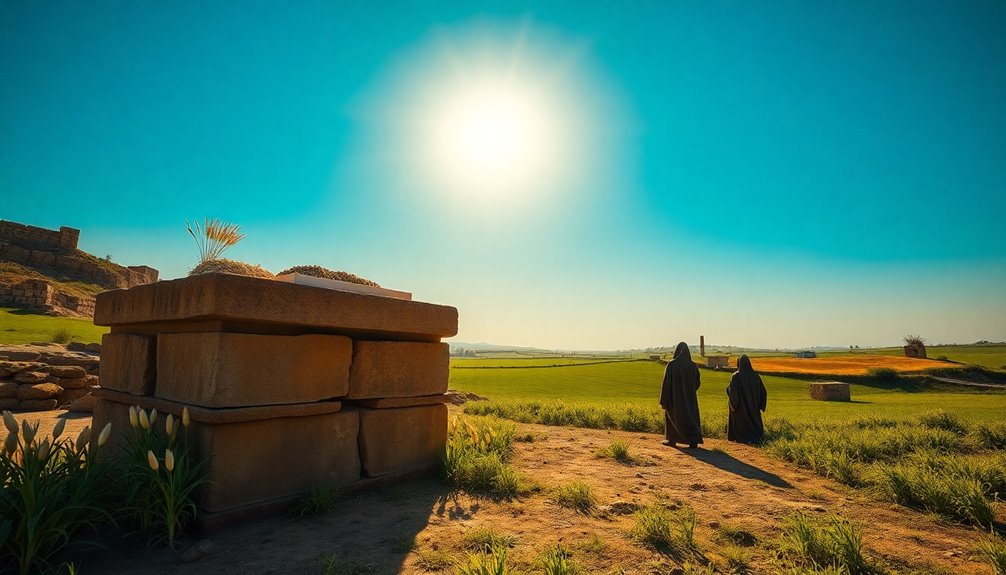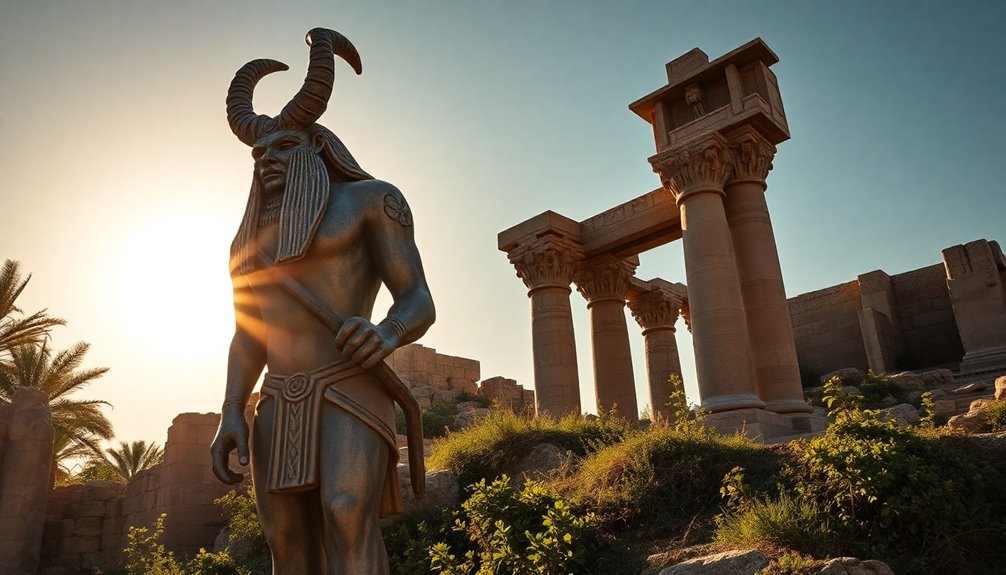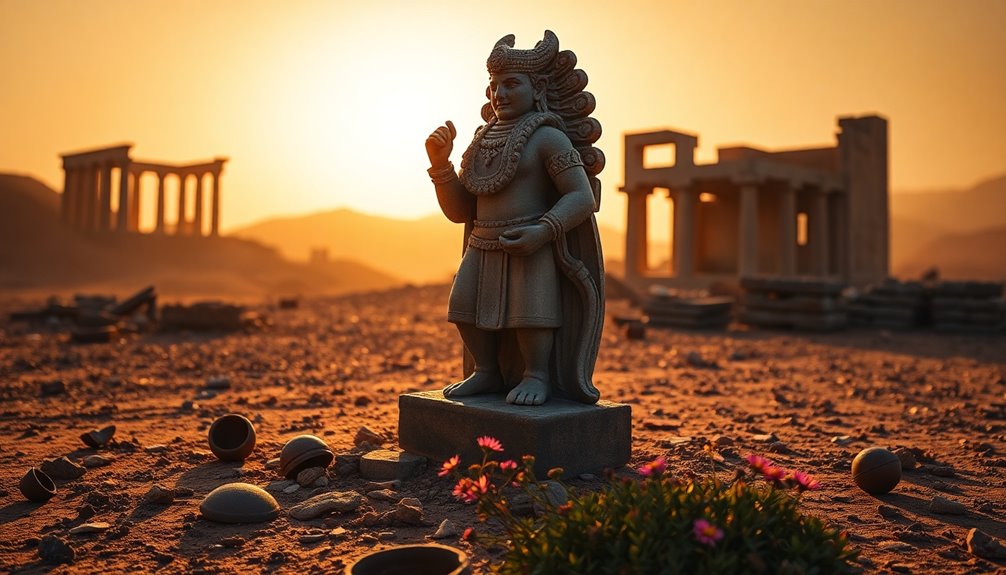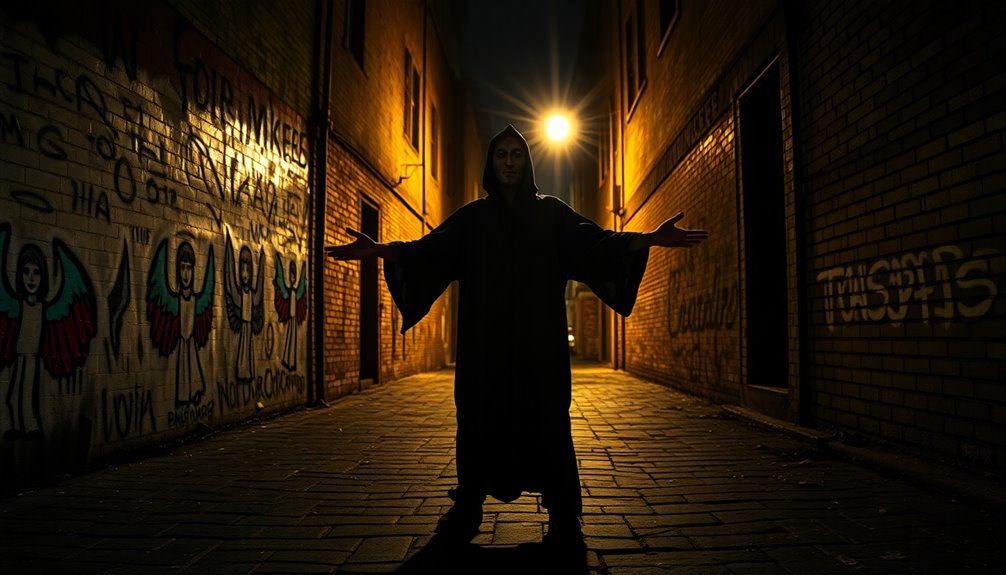Baal is a prominent figure in the Bible, often representing the conflict between Canaanite idolatry and the worship of Yahweh. You'll find his name mentioned nearly 90 times, highlighting this struggle. Known as a storm and fertility god, Baal was vital for agricultural success in ancient cultures. Key narratives, like Elijah's challenge on Mount Carmel, demonstrate his impotence when faced with Yahweh's power. Worship of Baal included elaborate rituals, sometimes even disturbing sacrifices. His enduring legacy influences both ancient and modern contexts, making the exploration of Baal's role quite fascinating. So, there's much more to uncover about this complex figure.
Key Takeaways
- Baal is a Canaanite god of storm and fertility, often depicted as a bull, and symbolizes agricultural success.
- He is mentioned nearly 90 times in the Hebrew Bible, representing the struggle against idolatry in Israel.
- A notable confrontation occurred between the prophet Elijah and Baal's prophets on Mount Carmel, demonstrating Yahweh's superiority.
- Baal worship involved rituals and sacrifices, including child sacrifices, aiming to secure agricultural fertility.
- His identity evolved into associations with Beelzebub in the New Testament, reinforcing his depiction as a false god.
Introduction

Baal, a prominent figure in the Bible, represents the intersection of ancient Canaanite religion and Israelite faith. As a Canaanite deity associated with storm and fertility, Baal became a focal point for Israelites during periods of idolatry. The name "Baal," meaning "lord" or "master," was often used for various local gods, complicating the Israelites' understanding of true worship.
When you explore the biblical narratives, you'll notice that Baal worship frequently challenged the monotheistic practices of Israel. Rituals dedicated to Baal sometimes involved disturbing acts, such as child sacrifice and ecstatic rites. This stark contrast to the worship of Yahweh highlights the cultural conflict within Israel.
One of the most significant events involving Baal is Elijah's confrontation with his prophets on Mount Carmel, where the impotence of Baal was publicly displayed alongside Yahweh's supremacy (1 Kings 18).
Throughout the Hebrew Bible, the term "Baal" appears nearly 90 times, often in contexts that condemn idolatry and warn against adopting pagan practices. Understanding Baal's role enhances your insight into Israel's spiritual struggles and their ongoing battle against cultural influences.
Biblical Verses on Baal

When you look at the biblical references to Baal, you'll find a complex picture of idolatry and conflict.
Key passages highlight both the widespread worship of Baal and the strong condemnation from prophets like Elijah.
Understanding these verses can help you grasp the significance of Baal in the context of Israel's spiritual struggles.
Primary Bible References
How does the Bible portray Baal, the prominent figure often associated with Canaanite worship? Throughout the Old Testament, Baal appears approximately 90 times, often representing various local deities linked to fertility and storms.
A significant narrative is found in 1 Kings 18, where Elijah confronts the prophets of Baal on Mount Carmel. In this dramatic showdown, the prophets fail to ignite their sacrifice, showcasing Baal's impotence compared to Yahweh's undeniable power.
Baal worship is consistently condemned in the scriptures, highlighting a fierce struggle against idolatry. For example, in Jeremiah 7:9, the prophets denounce those who worship Baal, calling attention to the folly of such practices.
Additionally, in Judges 6:32, Baal's influence is evident as Gideon earns the name Jerubbaal after destroying Baal's altar, embodying the rejection of this false god.
The references to Baal serve as a reminder of the constant battle between the worship of Yahweh and the allure of idolatry, urging you to recognize the significance of these biblical accounts in understanding the spiritual landscape of ancient Israel.
Secondary Bible References
Throughout the Bible, various verses illustrate the challenges posed by Baal worship and its implications for the Israelites. Baal is mentioned around 90 times in the Hebrew Bible, highlighting the conflict between worshiping this Canaanite deity and Yahweh.
In 1 Kings 18, the prophet Elijah dramatically confronts 450 prophets of Baal on Mount Carmel. He challenges them to call down fire from their god, which they fail to do, showcasing Baal's impotence compared to Yahweh's power.
In 2 Kings 1:2, King Ahaziah turns to Baal-Zebub, the god of Ekron, for guidance regarding his injuries. Elijah condemns this act as a blatant rejection of Yahweh, emphasizing the dangers of idolatry.
The Book of Hosea further stresses this message in Hosea 2:16-17, where God promises to remove Baal's name from the Israelites' mouths, calling them back to monotheism.
Jeremiah 7:9 criticizes the Israelites for engaging in idolatrous practices, including the worship of Baal, equating such actions with moral corruption.
These references collectively highlight the ongoing struggle against Baal worship and its consequences for the covenant community.
Canaanite Agricultural Fertility Rituals

Canaanite agricultural fertility rituals centered around Baal, the god believed to control rain and storms crucial for crop growth. These rituals were essential for ensuring agricultural fertility and abundant harvests.
Devotees performed various ceremonies that often included sacrifices, including offerings of animals and, in some instances, even child sacrifices, all aimed at winning Baal's favor.
Festivals celebrating Baal's return from the underworld marked significant points in the agricultural calendar, as people believed these events would ensure the land's fertility.
Temples in urban centers like Tyre and Sidon became hubs for these activities, where priests and priestesses led the rituals. They sought blessings for bountiful harvests, invoking Baal's power in the process.
The worship of Baal had a considerable influence on the Israelite community, often leading to conflicts with the worship of Yahweh.
During the period of the Judges and the reign of King Ahab, these tensions became particularly pronounced, as some Israelites turned to Baal in hopes of securing agricultural prosperity.
This clash highlights the struggle between the two religious ideologies and their differing views on agricultural fertility.
Baal's Influence on Ancient Worship

Baal significantly shaped ancient worship practices across the Near East, influencing both Canaanite and Israelite religious customs. As a prominent fertility god, Baal was often associated with storm and agricultural abundance, leading to rituals that included sacrifices and ecstatic practices. His worship infiltrated Israelite society during the Judges' period and the reign of Ahab, enticing many to adopt Baal's idolatry contrary to their covenant with Yahweh.
Rituals dedicated to Baal were notorious for their excesses, including temple prostitution and child sacrifices, practices condemned by prophets like Jeremiah and Hosea. These prophets warned against such idolatry, emphasizing Yahweh's supremacy over Baal. A pivotal moment in this conflict occurred on Mount Carmel, where Elijah confronted the prophets of Baal, demonstrating their impotence in comparison to Yahweh's power.
Festivals aimed at securing agricultural fertility reflected the deep dependency of ancient Canaan societies on seasonal rains and harvests, believed to be controlled by Baal. This intertwining of worship practices highlights how Baal's influence extended beyond mere religious rituals, affecting societal norms and the spiritual landscape of the time.
Baal's Identity in Ancient Cultures

When you explore Baal's identity in ancient cultures, you'll see how his divine status was often challenged.
While he held significant cultural importance as a storm and fertility god, many viewed him as a false deity, especially within the context of Israelite monotheism.
Understanding this tension reveals a lot about the spiritual landscape of the time.
Debunk Baal's Divine Status
In ancient cultures, the figure of Baal emerged as a prominent storm and fertility god, commanding significant devotion among his followers. His name, meaning "lord" or "master" in Semitic languages, reflects his authority in Canaanite society.
Baal's worship involved elaborate rituals, including sacrifices and ecstatic rites, which highlighted his importance in agricultural fertility and rain. However, the Hebrew Bible consistently challenges Baal's divine status, presenting him as a false god.
Yahweh, the God of Israel, stands in stark contrast to Baal. The prophets, like Elijah, actively debunked Baal's claims to divinity, emphasizing monotheism and the futility of idolatry.
These confrontations aimed to reveal Baal's limitations, especially in light of his ability to defeat powerful adversaries like Yamm and Mot in ancient texts. Despite his local adaptations—such as Baal of Peor and Baal-Berith—Baal ultimately fails to maintain a lasting hold over the people of Israel.
In the end, the narrative crafted by the prophets underscores that true power and authority belong to Yahweh alone, effectively dismantling Baal's perceived status and showcasing the dangers of misplaced worship.
Cultural Significance of Baal
The cultural significance of Baal in ancient societies can't be overstated, as he played a vital role in the daily lives and spiritual practices of the people. As a prominent deity in Canaanite and Phoenician cultures, Baal symbolized fertility, rain, and storms, often depicted as a powerful bull representing strength and virility. His name translates to "lord" or "master," serving as a title for various local gods, especially associated with agricultural prosperity.
Worship of Baal involved elaborate rituals, including sacrifices and ecstatic rites, reflecting the agricultural reliance on his favor for rainfall and fertility. In arid regions, these elements were crucial for survival. Baal's mythology highlighted his battles with deities like Yamm and Mot, emphasizing his role as a protector of life and sustainer of agricultural abundance. This cyclical view of life and death was central to ancient belief systems.
Moreover, Baal's influence extended beyond Canaanite religion, impacting neighboring civilizations like the Egyptians and later Greeks and Romans. They associated him with their own gods, such as Zeus and Cronos, showcasing his enduring cultural significance throughout the ancient world.
Modern Idol Worship Challenges

In today's fast-paced world, you might find yourself placing trust in material possessions or social status instead of focusing on your faith.
Just like the ancient worship of Baal, modern idolatry can creep in when good things—like relationships or careers—overshadow your devotion to God.
It's crucial to identify these distractions and strengthen your commitment to true worship.
Idolatry in Daily Life
Many people today find themselves navigating a landscape where modern idol worship challenges are all around. Idolatry often creeps into daily life through misplaced trust in material possessions, relationships, or societal values, distracting you from a genuine relationship with the true God.
Just as the ancient Israelites turned to Baal for prosperity, you might find yourself seeking fulfillment in success, wealth, or popularity—modern "baals" that can pull you away from true worship.
It's crucial to recognize the subtle forms of idolatry that can infiltrate your life. When personal comfort or convenience takes precedence over spiritual commitments, you risk losing your faithfulness.
Cultural pressures constantly promote these distractions, encouraging you to prioritize everything but God. In response, you're called to stand firm in your faith, just like Elijah challenged Baal worship.
Faith in Contemporary Society
Navigating faith in contemporary society can feel like walking a tightrope, where modern distractions constantly vie for your attention. Just as the ancient Israelites struggled with Baal worship, you face similar challenges today.
Modern idol worship often manifests as misplaced trust in material possessions, societal status, or personal achievements, diverting your focus from spiritual devotion to God. The pursuit of wealth, fertility, and success can become contemporary forms of idolatry if prioritized over your relationship with the divine.
To combat this, discernment is crucial. Recognizing modern "baals" in your life helps you avoid spiritual compromise.
Even good gifts, like relationships or careers, can overshadow your worship if you lose sight of their rightful place. Engaging with a community of faith can provide the support and accountability needed to resist these distractions.
This collective worship echoes the importance of spiritual vigilance seen in biblical narratives.
Baal's Enduring Cultural Legacy

Baal's legacy endures in various cultural and religious contexts, reflecting a complex interplay between ancient practices and later beliefs. You can trace Baal worship's influence through its significant impact on Israelite culture, where it led to episodes of idolatry and divine judgment noted in the Hebrew Bible. The dramatic confrontation between Elijah and the prophets of Baal on Mount Carmel highlights this cultural clash, showcasing the supremacy of Yahweh over Baal.
Often associated with fertility and agricultural prosperity, Baal was revered through rituals involving sacrifices and ecstatic practices aimed at securing favorable crops and rain. This reliance on Baal underscores the deep connection between ancient societies and their agricultural needs.
As time progressed, the legacy of Baal worship adapted, with elements merging into new belief systems. Notably, Baal's identity evolved into associations with Beelzebub in New Testament demonology, illustrating a shift in perception.
Interestingly, the term "Baal" began to be replaced by "boshet," meaning "shame," in Hebrew literature, signifying a cultural shift away from idolatry. This transformation reflects how deeply ingrained Baal's worship was, even as societies distanced themselves from it.
Additional Resources

To deepen your understanding of Baal and his role in ancient cultures, consider exploring a variety of resources that delve into historical, archaeological, and theological perspectives.
Books on ancient Canaanite religion provide insights into Baal's significance as a fertility god and his worship practices, which often included disturbing rituals like child sacrifices and temple prostitution.
You might find scholarly articles discussing the confrontation between the prophet Elijah and the prophets of Baal on Mount Carmel in 1 Kings 18 particularly enlightening. This account starkly illustrates the impotence of Baal compared to the power of Yahweh, emphasizing the ongoing struggle against idolatry faced by the Israelites.
Additionally, examining the works of prophets such as Jeremiah and Hosea can shed light on how they condemned Baal worship and sought to steer the Israelites back to Yahweh.
Lastly, consider visiting archaeological sites linked to Canaanite religion, where you'll find artifacts that reveal more about Baal's influence.
Frequently Asked Questions
What Was the God Baal Known For?
Baal was known for being a powerful Canaanite deity associated with storms, fertility, and agriculture.
You'd often see him depicted as controlling rain and thunder, which was crucial for crops. He engaged in epic battles against other gods, symbolizing his dominance and role in ensuring agricultural success.
His worship involved various rituals, including sacrifices, which sometimes included the unsettling practice of human offerings, particularly of firstborn children.
Who Is Baal Evil?
You might think Baal represents evil due to his association with idolatry and morally corrupt practices. His worship included child sacrifice and ecstatic rituals that often led followers into self-harm.
These actions are condemned in various texts, showing a stark contrast to the worship of a righteous deity. When you consider the prophets' denouncement of Baal and the impotence shown during challenges like Elijah's, it becomes clear why many view him as an embodiment of evil.
What Does the Bible Say About Baal?
The Bible warns against Baal worship, highlighting its association with idolatry and moral corruption.
You'll see numerous references to Baal, particularly in the context of rituals that conflict with the worship of Yahweh.
Prophets like Jeremiah and Hosea condemn these practices, emphasizing that true devotion lies with God alone.
Key narratives, like Elijah's confrontation with Baal's prophets, illustrate God's supremacy, showcasing the futility of worshipping false gods.
Was Baal a Fallen Angel?
You might wonder if Baal was a fallen angel.
In biblical texts, he's primarily seen as a Canaanite deity linked to fertility and storms, not as a fallen angel.
While some people connect Baal with demonic forces or idolatry, traditional narratives don't classify him that way.
Instead, he's portrayed as a false god, leading people away from true worship, but there's no direct evidence in the scriptures to label him a fallen angel.










